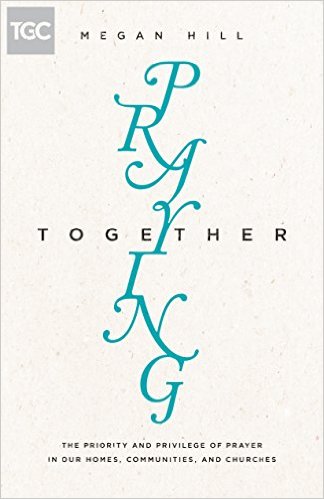My parents’ church has kneelers under its pews, and the congregation uses them during prayer. When we worshiped there recently, I noticed kneeling is a great equalizer. My husband stands 6’4” tall, but on his knees he seemed about the same as everyone else. Next to him, my kids got a boost from the padded surface and appeared taller than usual. Looking around the room, I watched petite grandmas straighten up and lanky athletes bend down.
On our knees, we were leveled.
Equally Needy

Whether or not we physically kneel, praying together makes way for mutual love by bringing us all into the same position. “So,” Paul writes, “if there is any encouragement in Christ, any comfort from love, any participation in the Spirit, any affection and sympathy, complete my joy by being of the same mind, having the same love, being in full accord and of one mind. Do nothing from rivalry or conceit, but in humility count others more significant than yourselves” (Phil. 2:1–3). Pride is the enemy of love. Humility is its best friend.
When we pray together, we pray in the humility of faith. We each come to prayer precisely because we are weak, needy, and sinful. We possess only what Thomas Manton called “the empty hand of the soul . . . [which] looketh for all from God.” A company of praying people is a company of people equally dependent on God. But we also come to prayer with equally good help. The most eloquent spiritual giant and the most timid new believer can pray boldly together because Jesus prays for them both.
Equally Useful
Not only does praying together remind us we’re equally needy and equally welcome before the throne; it also assures us we can be equally useful. Sadly, contemporary Christianity is plagued by unbiblical elitism. We esteem Christians who do stuff. An academic who formulates “big ideas” affects the world more than a child with Down syndrome. A 30-year-old who moves to Asia and rescues sex-trafficking victims is doing more for Christ than an elderly widow in a suburban nursing home. We value specialized skill sets and human strength and visible results.
But as it so often does, the Bible challenges our priorities. Listen to Paul’s report to the Colossian church:
Epaphras, who is one of you, a servant of Christ Jesus, greets you, always struggling on your behalf in his prayers, that you may stand mature and fully assured in all the will of God. For I bear him witness that he has worked hard for you and for those in Laodicea and in Hierapolis. (Col. 4:12–13)
Epaphras was doing extremely valuable work for the Lord. It was a constant struggle. It required a sacrifice of time and energy. It encouraged the saints and helped three different churches. It was really, really hard. He was praying in a prayer meeting.
Scripture commends Epaphras as a laborer in corporate prayer. Though praying together might not look like much to our results-driven culture, the Bible assures us work is getting done. When we pray, we call upon the God who convicts, converts, sanctifies, emboldens, empowers, and protects. When we pray, important things are happening.
Equally Praying

And all of God’s people can participate. As John Owen wrote, “The prayers of the meanest saints may be useful to the greatest apostle.” We are healthy. We are sick. We are male. We are female. We are young. We are elderly. We are rich and poor and solidly middle-income. We are all valuable laborers. In 1859 in Scotland the Lord graciously sent revival, as J. B. Johnston reported in his book: The Prayer Meeting and Its History. And in one community, revival began through the work of a woman with disabilities:
In Burghead, one of the fishing villages of the North . . . at a prayer-meeting, held in the house of a Christian woman, laid for the last thirty years on a bed of affliction, the burden of prayers, at her request, was for the outpouring of the Spirit, for the quickening of God’s people and the conversion of sinners. Ere long the careless fishing people were awakened, and many of them converted to the Lord; while the entire community, with few exceptions, was moved, and not a few, formerly without the pale of the church, came forward to confess the faith.
Because a woman who had not left her house for decades asked her friends to come over and pray, the Lord moved the course of an entire town.
We should also remember that it’s not just the one who prays aloud who does the work. While one person speaks, we all labor together in prayer, adding our “Amen” to his or her words. Perhaps one of the most loving things we can do is to pray together with saints who cannot pray aloud themselves.
In my own life, I’ve done real kingdom work with those whose minds have been crippled by illness and with those for whom words of prayer are physically impossible. I’ve wrapped my arms around a woman in a mental-health facility, praying aloud while she simply nodded. I’ve prayed alongside elderly Alzheimer’s patients and people dying of cancer—those for whom spoken prayer will not happen again until they bless Jesus to his face. I’ve prayed, too, in the company of unborn children with the sincere hope that they might, like John the Baptist, leap in praise though they cannot speak.
When we pray out loud alongside those who cannot, we pray for them—sharing our words when they have none of their own—and we pray with them—valuing their silent spiritual work as certainly as Christ values it, too.
On our knees together, we are leveled.
Editor’s note: This excerpt is adapted from Megan Hill’s new book, Praying Together: The Priority and Privilege of Prayer in Our Homes, Communities, and Churches (Crossway, 2016), released in connection with TGC’s Women’s Initiative. Also, don’t miss our fast-approaching National Women’s Conference, June 16 to 18 in Indianapolis. Hill will lead a workshop on “When Women Pray Together.” Workshops are filling up fast, so register now.
Is there enough evidence for us to believe the Gospels?
 In an age of faith deconstruction and skepticism about the Bible’s authority, it’s common to hear claims that the Gospels are unreliable propaganda. And if the Gospels are shown to be historically unreliable, the whole foundation of Christianity begins to crumble.
In an age of faith deconstruction and skepticism about the Bible’s authority, it’s common to hear claims that the Gospels are unreliable propaganda. And if the Gospels are shown to be historically unreliable, the whole foundation of Christianity begins to crumble.



































